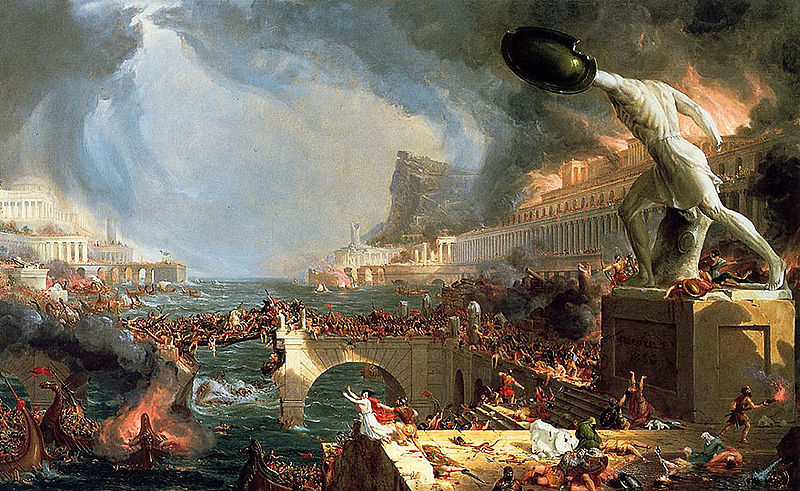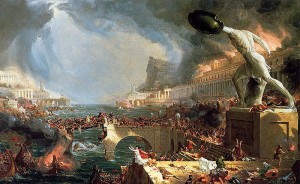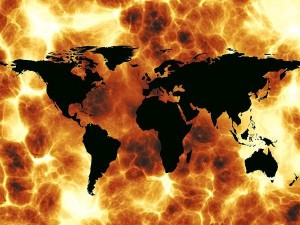
The Course of Empire by Thomas Cole
So then, the simplest gloss of humanity’s problems is that the world’s problem is humans.
We have clear threats to our existence, threats which, at the least, will credibly kill hundreds of millions to billions of people. We have known about these problems for a long time (recently, a friend told me about learning the science of climate change in 70s high school) and we have done nothing.
Well, not nothing…in most respects, we made it worse. When we did do something, we knew did what we were doing was not enough.
This is a human problem, caused by humans. It is simple to say “Well, the more powerful bear more responsibility,” and this is true, but as a whole, these are the leaders humanity has selected (this doesn’t imply most people want them).
As a race, we have proven incapable of managing the collective action problem and the leadership problem.
This is true despite what appear to be our great success: We can take massive actions, but we cannot control our actions for the common good.
Common good does occur at times; sometimes it is even intended, but we repeatedly drive ourselves off cliffs.
WWII being the easily predicted consequence of WWI is a good example. But take another example: the cradle of civilization, Mesopotamia. Understand that from the invention of agriculture, to today, about 10K years, Mesopotamia was probably the most advanced region in the world. Only Egypt and India were competitors.
Mesopotomia declined because they kept chopping down trees and draining swamps, and eventually turned their land into a desert or near-desert.
They had to know they were doing it, it was obvious. But they kept doing it.
We simply have never been good at collective action with a time-span beyond a generation. Sometimes we can act for three generations. And that, essentially, is it. And those periods during which we manage to act for three generations are rare, and come out of successfully handled crises, like the Great Depression and World War II. They last as long as the generations which experienced and understood the causes of the crisis exist, and then as long as the momentum of whatever works they created last.
So the New Deal generation and the post-war liberals created institutions and infrastructure, which despite their problems, worked. When these entities started to fail in the 70s, they did not collapse and they continue to stand, buttressing against the worst. As each component has been destroyed, a crisis has ensued; the most recent example being the financial crisis, which was the result of the removal of laws that control the financial industry, put in place after the Crash of ’29 (the removal of these laws was signed by Bill Clinton).
The New Deal generation over-built: They created bridges and roads meant to last a long time. They laid down more infrastructure than needed. But they didn’t, and couldn’t, build forever-infrastructure.
Their great work has concealed the nature of the decline, the nature of the ongoing collapse.
But the accounts of work they put away is mostly gone, in many cases in deficit.
Those who replaced them, having never survived a real crisis by pulling together, do not know how to do so. They cannot run a society for the common good, nor a society for the future.
And so billions will die and there is a great die-off of non-human species.
The common good and future generations matter because they are a way of making sure that what economists call negative externalities don’t get out of control. When we think only of ourselves and a few people we care about, rather than thinking about everyone and everyone’s grandchildren, we don’t properly manage society’s real wealth: people, knowledge, and the environment.
And we haven’t.
And the problem is this keeps happening. Over and over again.
We have too much power, and we cannot control it, because as a species we cannot control ourselves.
We claim, at times, to be creatures of reason, but not only are we driven by short-sighted, selfish desires, even when we use reason, we use it as a slave to those selfish desires.
And so the only solution to our problems is going to be a lot of death. It is nature’s solution, “you have exceeded carrying capacity, now you will die.”
It is too late to stop a lot of it. But mitigation requires different leadership than we have now. That leadership must be replaced, and it must be replaced by whatever means necessary.
Meanwhile, we need to understand that we, the masses, are complicit. The leaders are worse, of course, but they are the leaders which have arisen from humanity. They are not separate, they are a symptom of our pathologies.
We must become different people, different humans, if this is to end. That is, perhaps, possible, since we do most of our adaptation socially.
It’s that or die, and possibly wiped out.
The results of the work I do, like this article, are free, but food isn’t, so if you value my work, please DONATE or SUBSCRIBE.


 There are two major, interrelated environmental problems today. The first is climate change, the second is environmental collapse. The ecosystem is a very complicated web, from single celled organisms on up to apex predators and humans. When you unbalance it, when you take out chunks, the consequences cascade through the ecosystem, and it is possible for ecosystems to collapse, losing the ability to support higher forms of life, while the makeup of the lower parts changes significantly.
There are two major, interrelated environmental problems today. The first is climate change, the second is environmental collapse. The ecosystem is a very complicated web, from single celled organisms on up to apex predators and humans. When you unbalance it, when you take out chunks, the consequences cascade through the ecosystem, and it is possible for ecosystems to collapse, losing the ability to support higher forms of life, while the makeup of the lower parts changes significantly. You get the behaviour you reward.
You get the behaviour you reward.